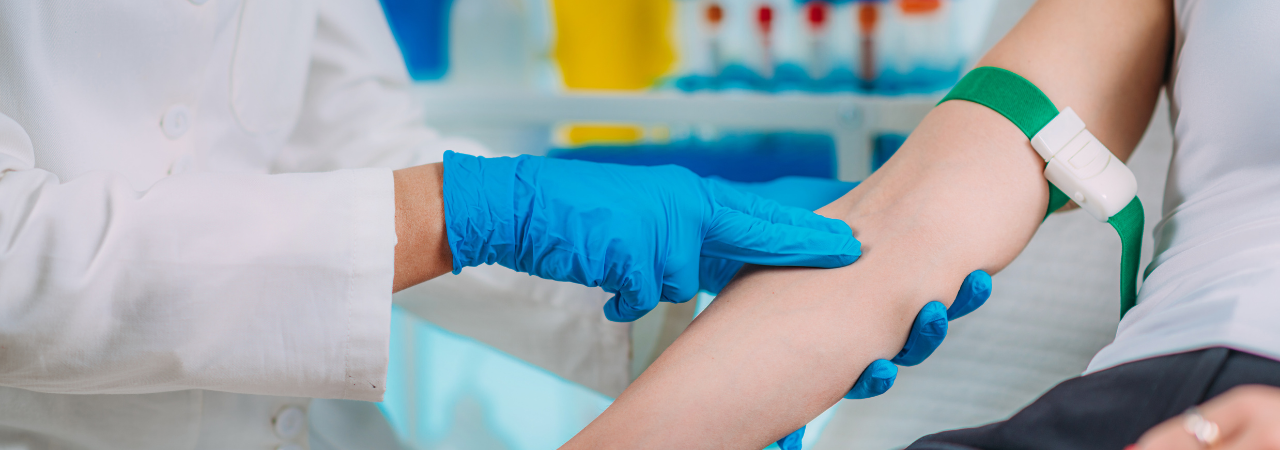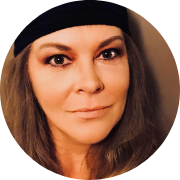

Stephanie Majoras worked in the hospitality industry for over 25 years. While she enjoyed her job and succeeded in her role, she decided to make a long-awaited career change during the pandemic. After researching career options, Stephanie decided to switch from the profession she had known her entire adult life to become a phlebotomy tech, as the field “checked all her boxes.” Since then, she took UTC’s Phlebotomy Tech course, earned her Certified Phlebotomy Tech (CPT) designation, and landed a job as a Donor Care Specialist at Blood Assurance.
Marah: What does your new role look like on a daily basis?
Stephanie: As donors arrive, I greet them and assist our receptionist with registering them. Then, I do a mini-physical and interview where the patient and I review their information together. After that, I set up all the blood bags, make sure all the paperwork is completed, and help with the blood collection process from beginning to end. There is a lot of multitasking as well as group interaction; my coworkers and I help each other out when needed since we are all trained phlebotomy techs.
M: What is your favorite part of your new role?
S: It is fantastic to be around so many positive folks that are doing an important job. The donors are amazing. They take time out of their schedules to do something for other people and give back to their community. It is a privilege to share that experience with them! Between the donors and my wonderful coworkers, there is great energy at work all day, every day.
M: What similarities and/or differences do you see between working in hospitality and as a phlebotomy tech?
S: As much as I loved hospitality, I knew I wanted to change careers. I also knew that I wanted to check a lot of the same boxes as a healthcare professional that I did as a hospitality professional. Both industries require multitasking, attention to detail, customer interaction, the ability to work in a stressful environment, and a good memory. They both work with the public and need to know the ins and outs of protocol as the one leading the experience. The daily tasks are different, but the skills required to do the jobs aligned well for me.
M: How would you say your life has changed from being in UTC’s program?
S: There have been definite lifestyle changes, all of which have been for the better. As much as I miss hospitality at times, I enjoy the schedule I have now. The ability to work first shift has allowed me to create a healthier sleeping and eating schedule. It is also much easier to plan time for fun activities. From better health to a better social life, there are many benefits to the schedule I have now.
M: How did UTC prepare you for your role?
S: I was able to build a strong foundational knowledge of phlebotomy by taking the course. The training I received at UTC prepared me well for both my career transition and my training at Blood Assurance.
M: What aspects of the course stick out to you?
S: I appreciated knowing there was a group of folks—my classmates—who were going through the same program as me. We were all on the same journey and learning the same information, so we were able to support each other in ways no one else could. The career change seemed less daunting knowing that I had a community of phlebotomists to support me. I walked into class thinking that, as the independent woman I am, I would simply get in and get out of class. However, the support of my classmates and instructor was greatly beneficial, even after graduating from the course.
M: What advice would you give to someone studying for their certification exam? Do you have any study tips you would share with them?
S: The program coordinator, Will Watson, set great study expectations from the beginning. He told me that the number one reason folks do not earn certification is because they do not spend time outside of the classroom preparing for the exam. You must take time to study on your own in conjunction with the course. The phlebotomy tech course is hard work, but in the end, certification is worth it. I carved out at least 30 minutes (sometimes more!) of time daily to review what I was learning.
I also had not been in a classroom in 30 years, so I knew I would have to learn how to study again. One thing that helped me get back into “study mode” was reading nonfiction books. I trained myself to read and retain information instead of just being entertained. Doing so helped stretch my brain muscles and prepared me for studying before the course even started!
M: Is there anything else you would like to share about your phlebotomy tech course experience?
S: I did my due diligence with researching the program to figure out if UTC’s course was a good fit for me. Once I went to the open house, I definitely realized what a terrific opportunity the course was. My enrollment led me to my position at Blood Assurance that I am absolutely thrilled with. I cannot say enough good things about the amazing career transition I have made and the part UTC played in that transition.
ABOUT THE AUTHOR:

Marah Whitaker (think Laura with an M) serves as the marketing assistant for the UTC Center for Professional Education. During the workday, she spends time writing blog posts, creating content for social media, developing email campaigns, and building relationships with CPE’s customer base. During her free time, you can find her getting lost in a good book, having spontaneous dance parties, playing piano, and going to Buffalo Wild Wings on Wing Night. Professionally and personally, she aspires to live by Mr. Feeny’s advice, “Dream. Believe. Try. Do Good.” She strives to use her passions to serve others and contribute positively to the world around her.
Connect with Marah on LinkedIn.